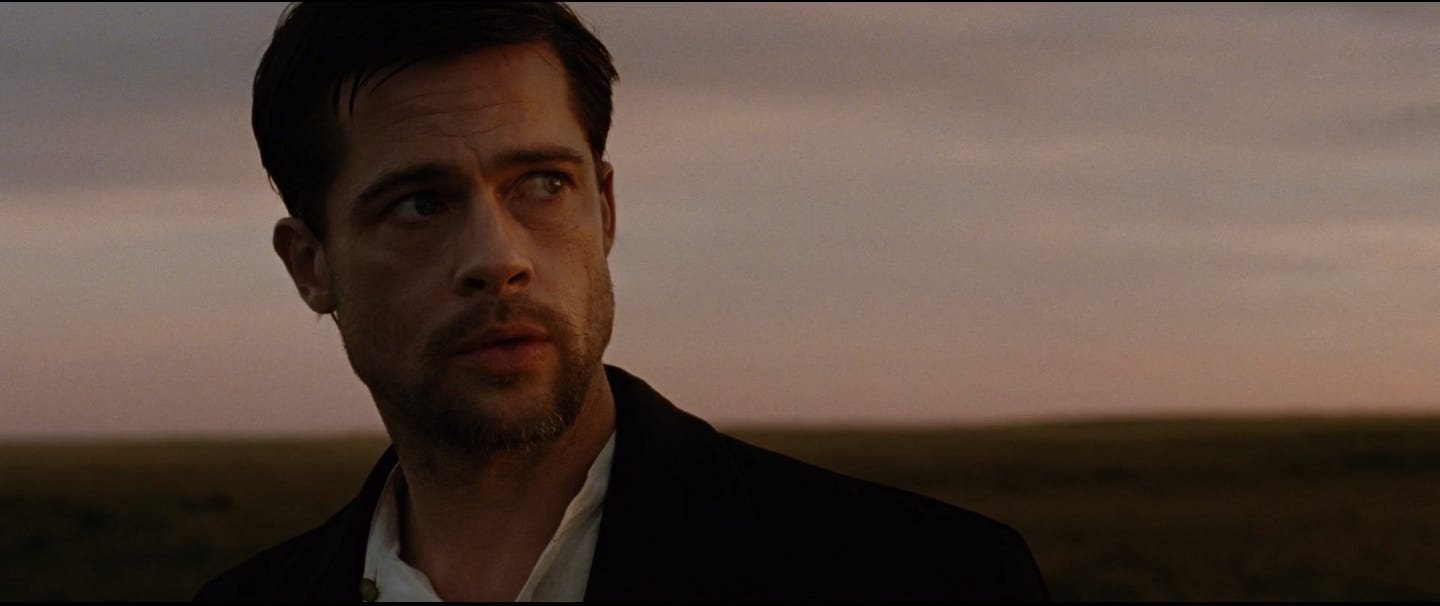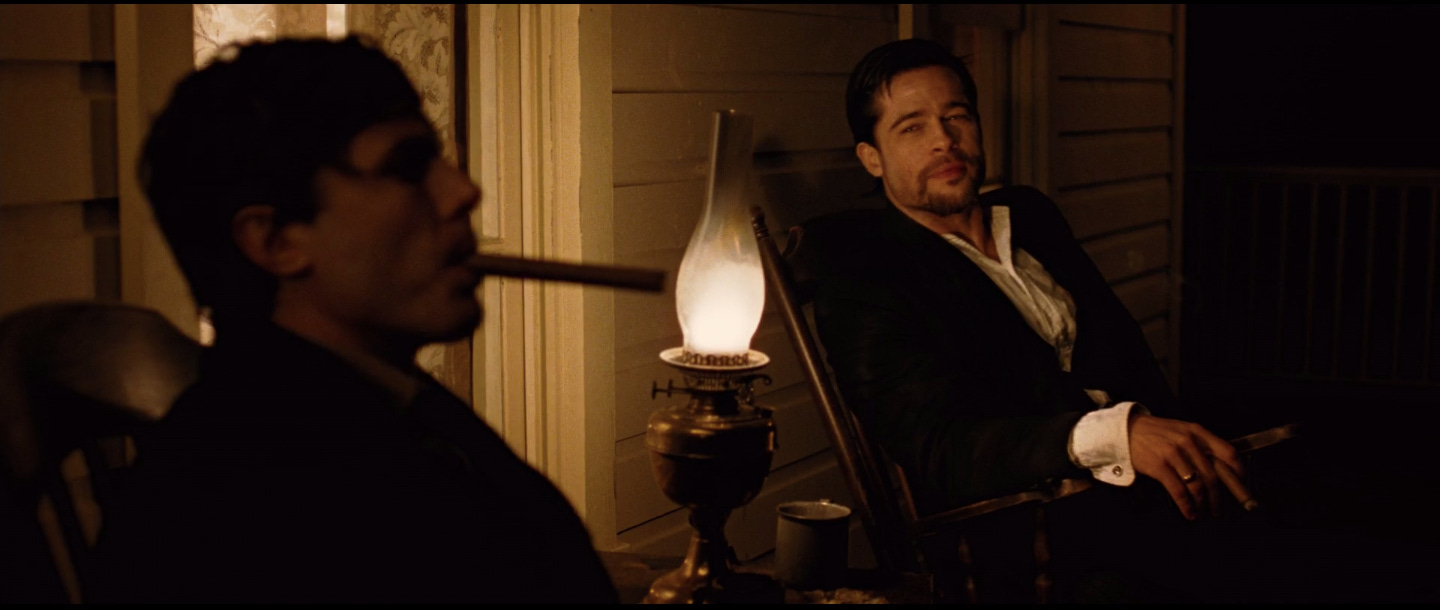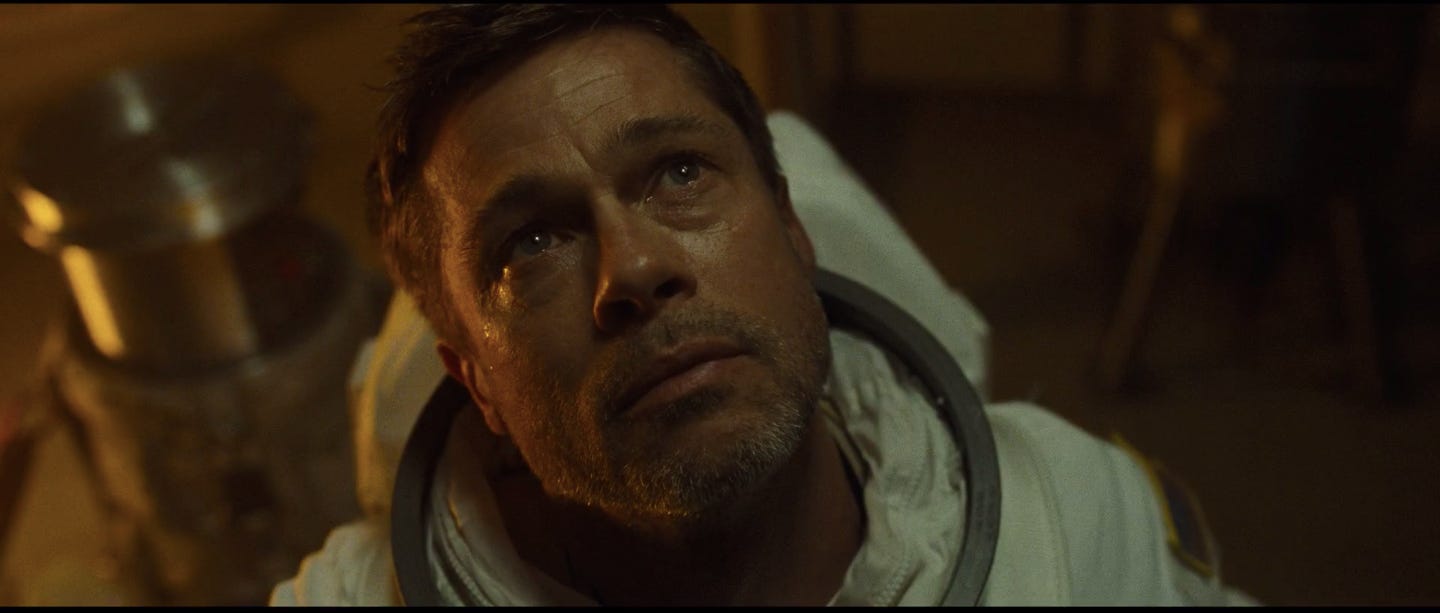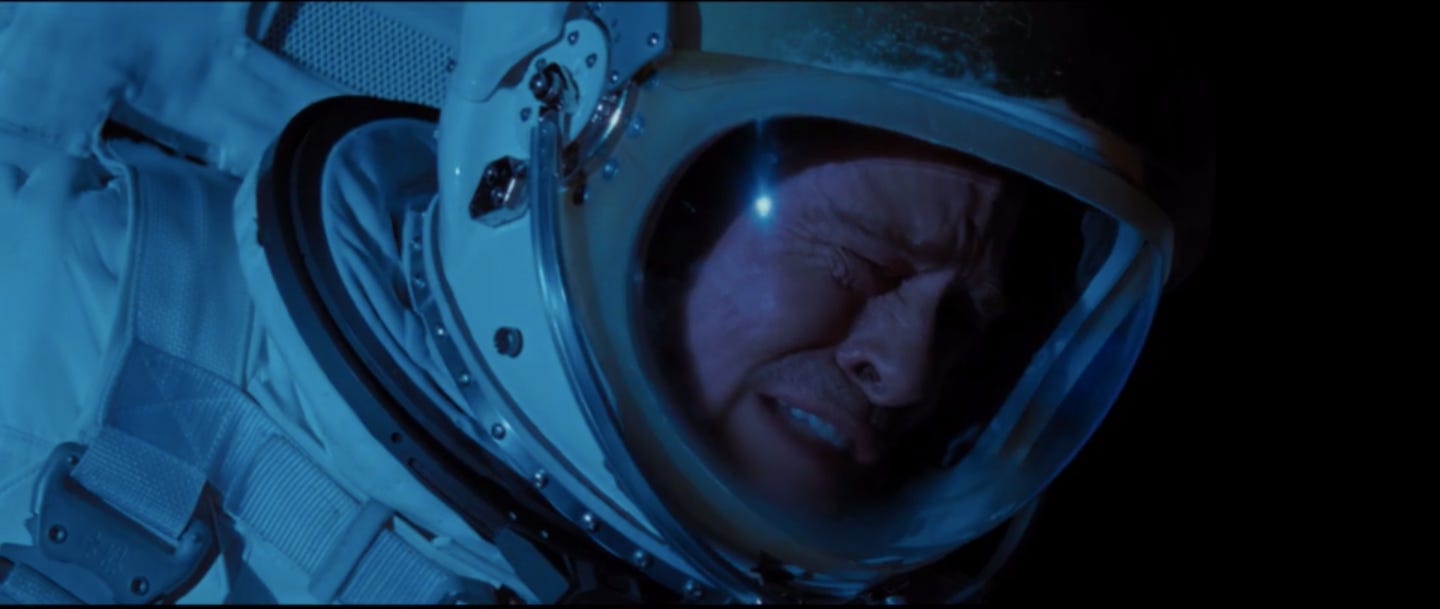I don’t know how Brad Pitt got to be the avatar of wounded American masculinity, but I don’t mind. Pitt is an actor who plays “regular guys,” or, more specifically, the kind of guy regular guys wish they were; dignified yet folksy, strong but not heartless or bullying, just enough swagger to be hot while also humble and approachable enough that you think he’d be fun to hang out with. His most famous role is literally an idealized picture of masculinity as it exists in some nerd’s imagination.
How Pitt managed to land this gig, looking the way he does, is anyone’s guess. Unearthly beauty like Pitt’s typically confines an actor to playing pretty boys and punchable upper-crust villains and Thors. James Marsden is a fine actor, but his perfect face means he will forever play the guy whose girl is stolen by some more “relatable” uggo. Pitt has transcended that. He is obviously better and prettier and luckier than any of us, yet when we see him on screen, we still think that’s me.
This effect has gotten stronger in recent years. Maybe it’s just that age has put some wear on him, given him a crinkled, leathery look that brings him closer to our level. Maybe it’s that being handsome and rich hasn’t necessarily spared him trouble. There have been two divorces, both messy, one entailing a high-profile custody dispute. There was a drinking problem. Brad Pitt is now a single man, closer to sixty than fifty, with gray hair and children he doesn’t always see and recovery meetings to attend, and sure, there are consolations, like the fact that he lives in a mansion and every person on Earth would fuck him, but that is still a guy who has pain to contend with. That is not always the easiest guy to be. In the moments when Pitt’s characters are still, when they are alone with themselves and we see sadness overtake them, there is an increasingly keen sense that he’s not acting.
So Brad Pitt has morphed, over the years, from the picture of idealized masculinity into some kind of walking Michael Kimmel tract, less a monument to American manhood than a reminder of how it can hurt the men who embody it. Pitt still plays “regular guys,” but those guys are, increasingly, fuck-ups: Guys going through divorces, guys who have tense relationships with their ex-wives, guys who are failing at fatherhood, guys whose fathers failed them. All of this dangerous emotional openness is filtered through their ridiculously macho lines of work — it’s not a movie about loneliness, bro, it’s about BASEBALL or COPS or ASTRONAUTS or WORLD WAR TWO — and it does occasionally seem like you could sum up his entire filmography with this one song from Crazy Ex-Girlfriend. (Or maybe this one.) Still, there’s real melancholy, if you look.
It’s hard for men to talk about this stuff, or so they tell me. It’s painful to expose the bruises beneath the armor. If they need cheesy sports metaphors to do it, who am I to complain? White American cishet men have chosen Brad Pitt as the means through which they process the wounds of patriarchy, and as insufferable as that project might sound, at least they chose someone easy on the eyes.
All of this ran through my head within the first five minutes of The Assassination of Jesse James by the Coward Robert Ford, in which Brad Pitt is introduced to us as, literally, the embodiment of all that is good and right about manhood. He is Jesse James, “growing into middle age,” a father, a husband, someone with a nightly cigar and a favored rocking chair, who can only drink one beer at the bar before leaving; he is beloved, both dignified and folksy, strong but not bullying, handsome but good to talk to, “someone wealthy, with the common touch.” He’s the Brad Pitt of the Old West, and when the camera finally settles on a long close-up of Pitt’s famous face at sunset, that’s the message: This guy. However you feel about the man you’re looking at, that was Jesse James.

But, though Jesse James is the subject of the movie, its hero is a boy who grew up in love with Jesse James: Twitchy, nerdy masculinity failure Robert Ford, as played by genuinely unlikable human being Casey Affleck. Ford sees himself as unjustly rejected by society, made fun of and called a weakling, and he wants to join James’ famous gang of train robbers to prove he can be a man. That’s what he says, anyway. Primarily, the man he wants to be is Jesse James, or at least someone who matters very much to Jesse James. He finds a way to matter. It’s in the title. But love takes time to curdle, and we get three hours to watch this one go bad.
Ford’s longing for Jesse is probably romantic, in some sideways, half-conscious manner. He reads obsessively about the James Gang, and when he shares an excerpt from his reading, he chooses a passage about how handsome Jesse is. He memorizes intimate little details of Jesse’s body; his height, his shoe size. When he watches Jesse speak, he absorbs himself in studying the man’s every mannerism, soaking them in “as if he were preparing an impression.” Alone in bed, he turns his hand into Jesse’s hand, pretending to be missing the same finger as his hero. There are echoes of Matt Damon stalking Jude Law in The Talented Mr. Ripley — the need to cherish someone bleeding into the need to control them, and, ultimately, be them. As in Ripley, Jesse puts a stop to their friendship after Ford admires him in the bath, seemingly twigging that his new hire’s attention is more than chaste.
Yet The Talented Mr. Ripley is a smaller, more human story. Tom Ripley wants Dickie Greenleaf to be his boyfriend, and then, having experienced the way Dickie treats people, he wants to murder his boyfriend with a boat oar. Jesse James is less a man than a local god. He doesn’t live in the West, he incarnates it. Bob Ford’s obsession with Jesse is sexual only on its way to being spiritual. He’s trying to be a man; how can he not look to his era’s avatar of manhood? He wants to be Jesse, but isn’t Jesse what all men are supposed to be?

What kills Bob’s love for Jesse is not just rejection, but the dawning realization that he has put his faith in the wrong god, and that the hero of his boyhood is actually a deeply sociopathic human man. The train robberies James is famous for are brutal events where innocent men get their skulls caved in, and Jesse seems to delight in their suffering. He beats a small boy for information. The legendary James Gang is comprised of venal, small, unlikable men who squabble over sex and tell racist jokes when they’re not plotting to betray each other. It’s an ugly, grubby, fucking-your-friend’s-stepmom-in-the-outhouse life that has somehow been made glorious in the retelling.
Jesse James is not an ideal anyone should aspire to, and when he learns how much Bob Ford loved him as a child, he can’t even bother to be gracious. He laughs in the face of Ford’s love, takes away his one holy thing with a smile. Bob finds himself in the position of a man who was told superheroes were real and now finds himself hanging out with a bunch of guys in leotards outside a bus station. He’s destroyed his dream by living it, and without his dream, he has nothing to aspire to, no-one to become. That loss is what he’s avenging when he picks up the gun to kill Jesse James.
I cringed at how well I understood Ford. He’s such a familiar type: Sweaty, picked-on, socially awkward, determined to redeem himself or his manhood through violence, convinced that being rejected gives him the right to kill the rejecting person. He could be an incel, a GamerGater, a school shooter. He could be gunning down John Lennon in Central Park. The world never stops coming up with young white men like these.
Yet I understood the depth of his love for Jesse and his need for guidance. I know that realizing that your hero is unworthy can break you. My dirtiest secret is how much I want certain men to like me. It doesn’t happen often, but when it does, it’s bad: I can spend months or years working for their approval, contorting myself into new shapes, putting on show after dazzling show, wasting chunks of my youth and health trying to get that all-important pat on the head. It’s a gross, bizarre, humiliating stew of human needs, and those needs, sad to say, aren’t sexual. If I were trying to get laid, I’d be less embarrassed. I’m looking for the man who knows better than I do; the man who can teach me how I ought to be. It’s something people without fathers do.
Thus, we head into Ad Astra, in which Brad Pitt travels to the edge of the solar system to ask his Dad why they never played catch when he was growing up. Ad Astra begins, as all Brad Pitt movies evidently must, with a scene explaining that Brad Pitt is a literally perfect man. This version of Brad is named Roy, and he’s an astronaut in a time of deep space exploration, capable and resolute and perpetually endangered. We first meet him when his space station explodes and he has to parachute (parachute!) through the Earth’s upper atmosphere and down to Earth. His pulse, we’re told, “has never gone above eighty” during this or any of the many similar situations he’s encountered.
So Roy can conquer space. But can he conquer… traditional gender expectations???? As we will soon learn, he really, really cannot. Pitt’s performance of idealized masculinity is given yards of explicit voiceover, telling us exactly what he’s doing right — he is stoic, strong, independent, confident, rational; he gives himself little affirmations like “I will not rely on anyone or anything, I will not be vulnerable to mistakes”— and we are also told, with equally explicit voiceovers, that all of this is an act. He is terrified of being touched, of being held, of being seen; he cannot sustain intimacy; he is consumed with grief over the disappearance of his father, who went to Neptune to find intelligent life and/or a pack of cigarettes and never came back.

Luckily, Roy’s outer-space commanders have constructed a quest through which he can resolve all those childhood issues. Roy’s father may still be alive somewhere near Neptune, afflicted with Space Madness, and they believe his son could convince him to come back home. So off Brad goes, through the incredibly symbolic distance and absence of deep space, looking for a human connection with the man who first traumatized him into avoiding them. There are various cool outer-space adventures along the way — Roy has to drive a rover over the moon’s surface while evading gun-toting pirates; he explores an abandoned research station and gets attacked by enraged baboons — but though these scenes are tense, they’re shot with a Kubrickian chilliness and silence that emphasize just how emotionally absent Roy is from the action. Over time, his ability to watch death and horror without reacting seems less like manliness and more like a sign that something is seriously wrong with him.
Of course, Roy knows he’s broken. This is a movie that does not know subtext, and every emotion gets its own little monologue to drive it home. After the baboon incident, for example, Roy lands here:
It was full of rage. I understand that rage. I’ve seen that rage in my father, and I’ve seen that rage in me. I’m angry that he took off. He left us. But when I look at that anger, if I push it aside, and just put it away, all I see is hurt. I just see pain. I think it keeps me walled off from relationships and opening myself up and really caring for someone. I don’t know how to get past that, and it worries me. I don’t want to be that guy. I don’t want to be my dad.
Again, this is incredibly Ground Control To Major Thomas Page McBee. It’s also incredibly easy to make fun of; this is a movie where Brad Pitt’s dad explains that he never really cared about Brad or his mother by literally saying “I never really cared about you or your mother,” which, sure, is probably the Space Madness talking, but which is also a really rude way to open a conversation after you’ve made someone drive all the way to Neptune to pick you up.
Still, on some level, I’m making fun of Ad Astra because it got to me. It moved me, in ways that are stupid and stereotypical and embarrassing to talk about. I was half-watching the movie while working out (shut up) and this speech made me stop what I was doing and pay attention. The pain there is very real. Sure, it’s bluntly and awkwardly expressed, and it has none of the careful nuance and vocabulary you tend to find in women’s descriptions of their trauma — watching this movie talk about feelings is a bit like looking at a first-grader’s drawing of the Mona Lisa — yet that’s probably how pain has to sound when you’re talking about it for the first time.

In Ad Astra, Brad Pitt plays a son who goes looking for his idealized father and finds him to be a heartless monster. In The Assassination of Jesse James, he plays the idealized father figure to a younger man, and his heartlessness lets that man down. What you realize, watching one man play both parts, is how perpetually this drama renews itself. Little boys believe their fathers to be Gods, and in time find that they are men too deeply damaged to give or receive love; those boys grow up to be fathers, and damage the boys who worship them. And so on.
This inability of men to raise each other is so common that basically every movie about guys centers on it. I am not the only person who’s been limping through the world looking for a Dad all this time, it turns out. Yet systems work as they are intended to. The way fathers let sons down, turning sweet little boys into wells of pain surrounded by anger surrounded by numb performances of compliant American manhood, is an intended outcome. Damaged, hollow men who only feel safe when they’re in charge of something are exactly what patriarchy needs to secure its survival.
What those men need, as it turns out, is Brad Pitt. He’s become one of their favorite ways to tell these stories, and it’s only by telling them, over and over and with increasingly blatant space metaphors, that we can start to piece them together and identify the larger structure underpinning all that grief. I don’t know that I would call Brad Pitt a feminist. I don’t know if he’s even nice to women. [UPDATE: He is not.] But trying to be like Brad Pitt hurts everyone, including Brad Pitt, and at least he admits it. He’s standing at the top of the heap for white American masculinity, warning men that there’s no relief once they get there. That warning is a first step. The next step is finding somewhere better to go.
Ad Astra and The Assassination of Jesse James by the Coward Robert Ford are both available to rent on Amazon Prime or Google Play.
In its last hour, WandaVision became just another superhero show. Here’s my column on how, before that hour hit, it was perfectly acceptable soft-serve pop psychology, pitched to a moment when most of us aren’t capable of harder stuff.
Brad Pitt Month is dedicated to John DeVore, who asked me to write for his magazine about masculinity, and had no way of knowing why I was too self-conscious to pitch any articles about masculinity. I hear John has an important space mission on Pluto, but I bet, when he comes back, he’ll tell me I did a good job.